Herbal teas effectively promote relaxation and improve sleep quality. Key varieties like chamomile and valerian root offer unique calming properties. Preparation tips enhance their benefits, ensuring optimal extraction of active compounds. Regional variations highlight diverse preferences and methods for maximizing relaxation.
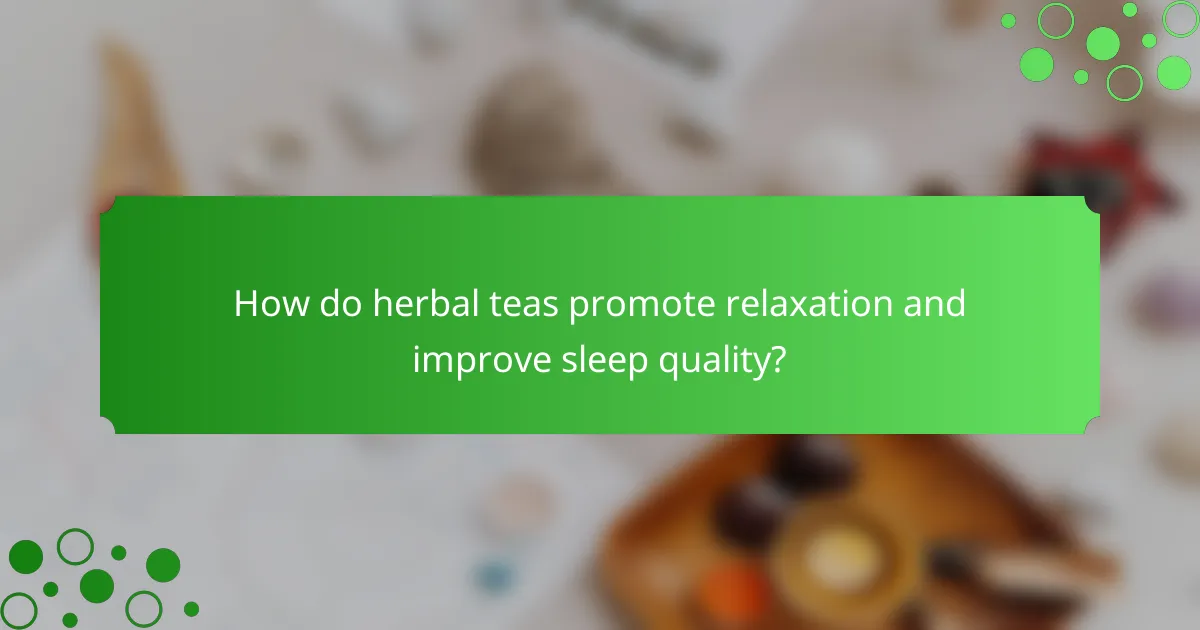
How do herbal teas promote relaxation and improve sleep quality?
Herbal teas promote relaxation and improve sleep quality through their calming properties and natural compounds. Certain herbal teas, like chamomile and valerian root, contain unique attributes that enhance relaxation and reduce anxiety. Chamomile, for instance, has apigenin, which binds to brain receptors to induce sleepiness. Valerian root may improve sleep latency and overall sleep quality. Preparing herbal teas with hot water for 5-10 minutes allows for optimal extraction of these beneficial compounds. Regular consumption can lead to better sleep patterns and overall well-being.
What are the key ingredients in herbal teas that aid relaxation?
The key ingredients in herbal teas that aid relaxation include chamomile, valerian root, lavender, and passionflower. These herbs contain compounds that promote calmness and improve sleep quality.
Chamomile is known for its soothing effects and can reduce anxiety. Valerian root helps decrease the time it takes to fall asleep. Lavender has a calming aroma that can enhance relaxation. Passionflower is often used to treat insomnia and anxiety, making it a great addition to relaxation teas.
Combining these ingredients can create a powerful herbal tea blend that supports restful sleep and relaxation.
Why do certain herbal teas have sedative properties?
Certain herbal teas possess sedative properties due to their natural compounds that promote relaxation and sleep. Herbs like chamomile, valerian root, and lavender contain specific phytochemicals that interact with neurotransmitters, enhancing feelings of calmness. For example, chamomile contains apigenin, which binds to receptors in the brain, leading to reduced insomnia symptoms. Valerian root is known for its unique ability to decrease the time it takes to fall asleep, making it a popular choice for those seeking sleep improvement. Additionally, preparation tips such as steeping these herbs for the recommended duration can maximize their soothing effects, ensuring users benefit fully from their relaxing properties.
How does the brewing process affect the calming effects of herbal teas?
The brewing process significantly influences the calming effects of herbal teas. Factors like water temperature, steeping time, and ingredient quality determine the release of beneficial compounds.
Higher temperatures can extract more active ingredients, enhancing relaxation properties. For example, chamomile brewed at 200°F releases more apigenin, a compound linked to sleep improvement.
Steeping time also matters; longer steeping can intensify flavors but may lead to bitterness. A balance of 5-10 minutes is often ideal for maximizing calming effects without compromising taste.
Using fresh, high-quality herbs ensures optimal potency. Dried herbs lose efficacy over time, reducing their relaxing benefits. Prioritizing quality and proper brewing techniques enhances the overall experience of herbal teas for relaxation.
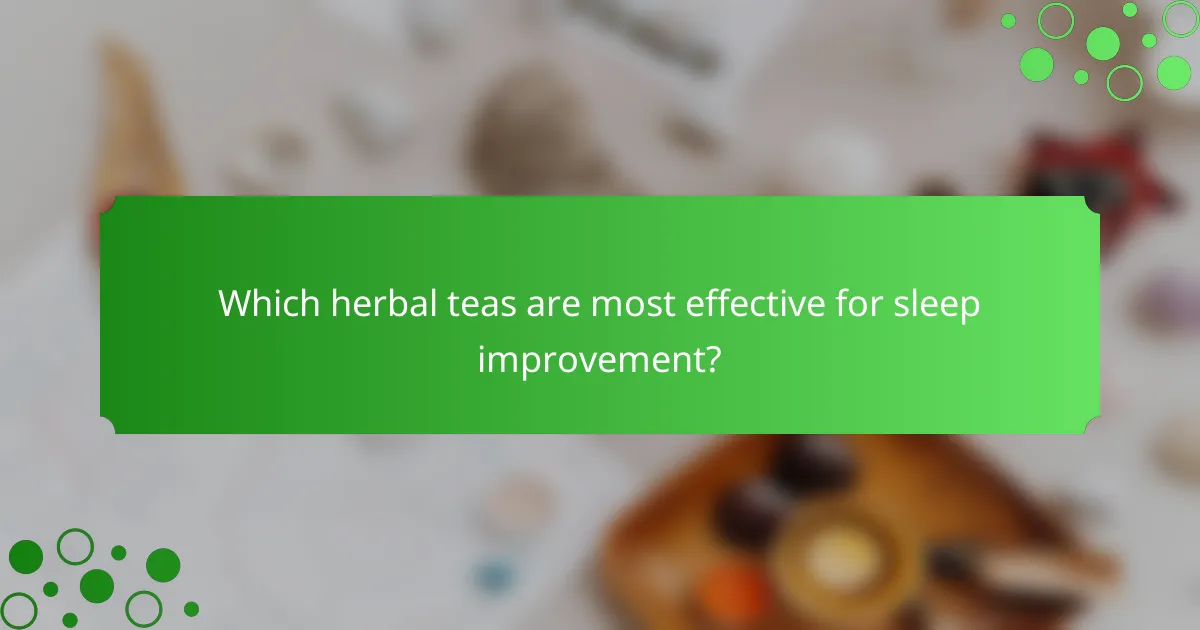
Which herbal teas are most effective for sleep improvement?
Herbal teas such as chamomile, valerian root, and lavender are highly effective for sleep improvement. Chamomile contains apigenin, which promotes relaxation. Valerian root reduces the time taken to fall asleep, while lavender enhances sleep quality. Prepare these teas by steeping the herbs in hot water for 5-10 minutes.
What are the benefits of chamomile tea for sleep?
Chamomile tea promotes better sleep through its calming effects and natural sedative properties. It contains apigenin, an antioxidant that binds to brain receptors, reducing insomnia and improving sleep quality. Regular consumption may also decrease anxiety, allowing for a more restful night. Additionally, chamomile tea is caffeine-free, making it an ideal evening beverage.
How does valerian root tea help with insomnia?
Valerian root tea effectively aids in insomnia by promoting relaxation and improving sleep quality. The tea contains compounds that enhance GABA levels, a neurotransmitter that calms the nervous system. Studies indicate that valerian root can reduce the time it takes to fall asleep and improve overall sleep quality. Regular consumption may lead to a more restful night, making it a popular choice for those seeking natural sleep remedies.
What unique qualities make lavender tea a popular choice for relaxation?
Lavender tea is popular for relaxation due to its calming aroma and ability to reduce anxiety. Its unique qualities include high levels of linalool, which promotes relaxation, and antioxidants that support stress relief. Studies show that lavender tea can improve sleep quality, making it a preferred choice for those seeking restful nights. Additionally, its pleasant flavor enhances the overall experience, encouraging regular consumption for stress management.
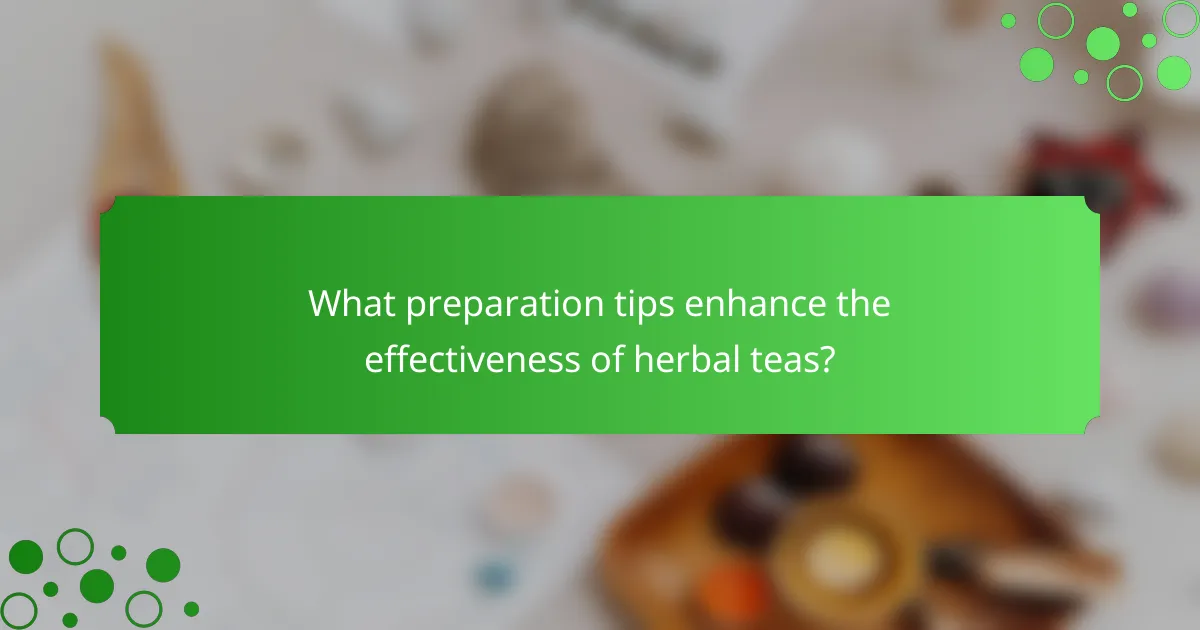
What preparation tips enhance the effectiveness of herbal teas?
To enhance the effectiveness of herbal teas, consider these preparation tips. Use fresh, high-quality herbs to maximize flavor and benefits. Steep the herbs in hot water for the recommended time, typically 5-10 minutes, to extract active compounds. Cover the tea while steeping to retain heat and volatile oils. Adjust the water temperature based on the herb type; delicate herbs require lower temperatures, while robust ones can handle boiling water. Experiment with additional ingredients like honey or lemon for flavor and added benefits.
How should herbal teas be brewed for maximum potency?
Herbal teas should be brewed with boiling water for 5 to 10 minutes to maximize potency. This method extracts beneficial compounds effectively, promoting relaxation and sleep improvement. For optimal results, use dried herbs rather than tea bags, as they contain more essential oils and nutrients. Adjust steeping time based on the specific herb; for example, chamomile benefits from a shorter steep, while valerian root requires longer infusion.
What are the best practices for selecting high-quality herbal teas?
To select high-quality herbal teas for relaxation and sleep improvement, focus on sourcing from reputable brands, checking for organic certification, and examining ingredient transparency.
Prioritize teas with calming ingredients like chamomile, lavender, or valerian root. Look for whole leaf teas instead of dust or fannings, as they typically offer better flavor and potency.
Consider brewing methods; steeping in hot water for the recommended time enhances the efficacy of the herbs. Finally, read reviews and ratings to gauge user experiences with specific blends or brands.
How can the timing of tea consumption impact sleep quality?
Timing tea consumption can significantly impact sleep quality. Consuming herbal teas like chamomile or valerian root 30-60 minutes before bedtime promotes relaxation and improves sleep onset.
Herbal teas contain natural compounds that can enhance sleep. For instance, chamomile has apigenin, which binds to brain receptors to reduce insomnia. Consuming these teas too close to bedtime may lead to nighttime awakenings due to increased urination.
A study found that participants who drank herbal tea before bed reported better sleep quality than those who did not. The ideal timing is crucial to maximize the benefits without disrupting sleep.
In summary, for optimal sleep quality, enjoy herbal teas at least an hour before sleeping to leverage their calming effects and avoid sleep disruption.
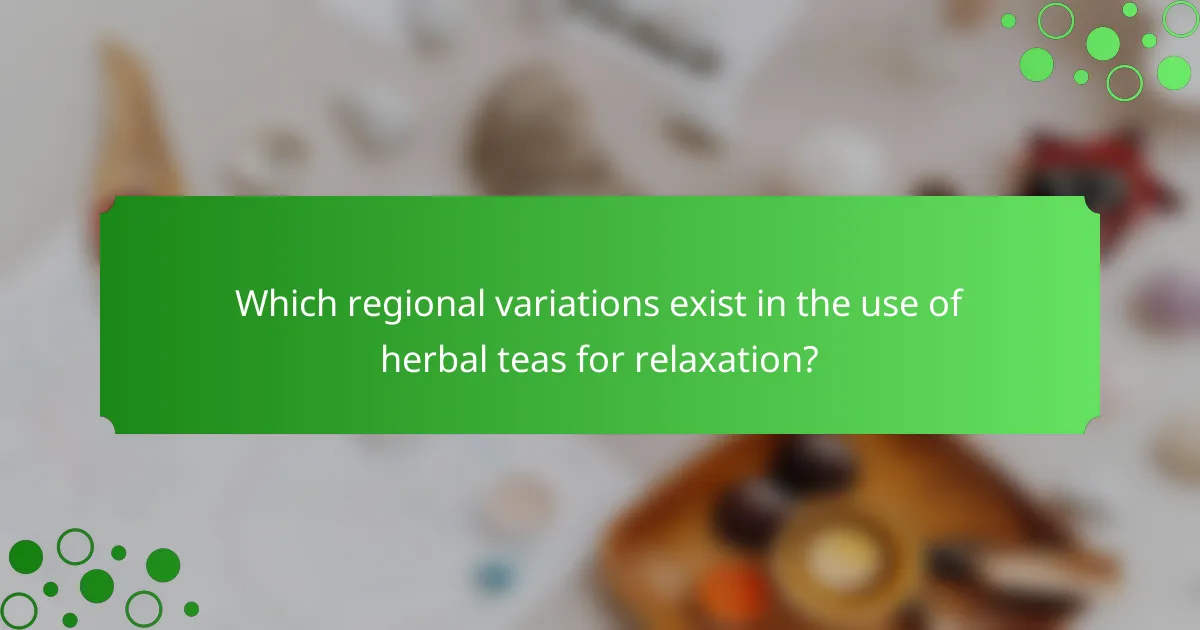
Which regional variations exist in the use of herbal teas for relaxation?
Regional variations in herbal tea use for relaxation include diverse preferences and preparation methods. In Asia, chamomile and jasmine teas are popular for calming effects, while in Europe, valerian root is often used for sleep improvement. North America favors peppermint and lemon balm for their soothing properties. Each region may also incorporate unique local herbs, such as passionflower in South America, enhancing relaxation benefits.
What herbal tea blends are popular in North America for sleep improvement?
Popular herbal tea blends in North America for sleep improvement include chamomile, valerian root, lavender, passionflower, and lemon balm. These blends are known for their calming effects and ability to promote relaxation and better sleep quality.
Chamomile tea is widely recognized for its soothing properties, while valerian root is often used for its sedative effects. Lavender tea not only offers a pleasant aroma but also helps reduce anxiety. Passionflower is known to ease insomnia, and lemon balm can enhance mood and reduce stress.
Preparation tips for these teas include using fresh or dried herbs, steeping for 5-10 minutes, and enjoying them before bedtime to maximize their benefits.
How do European herbal tea traditions differ in relaxation practices?
European herbal tea traditions vary significantly in their relaxation practices, often reflecting regional customs and herbal preferences. For example, chamomile is favored in Germany for its calming effects, while in France, lavender is commonly used for stress relief.
In Italy, herbal blends often include lemon balm, known for its soothing properties. Each tradition emphasizes different preparation methods, such as steeping times and temperature, which can influence the tea’s efficacy.
Additionally, the cultural context shapes these practices; for instance, tea rituals in England prioritize social interaction, enhancing relaxation through community. Overall, these differences highlight the rich diversity in how herbal teas are utilized for relaxation across Europe.
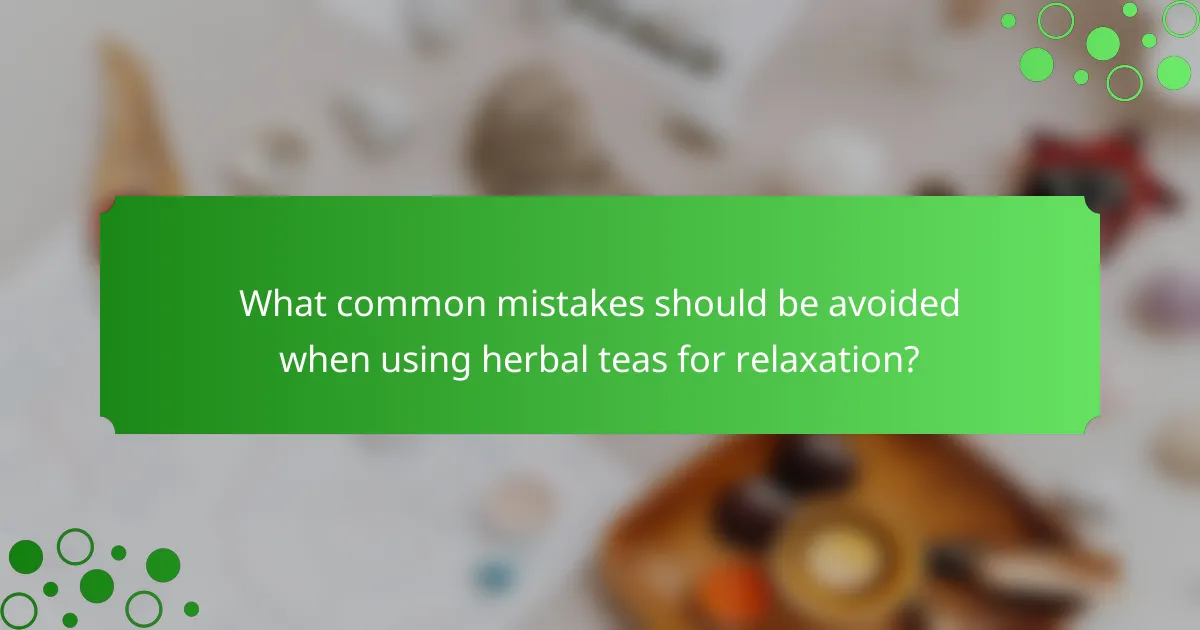
What common mistakes should be avoided when using herbal teas for relaxation?
To maximize relaxation benefits from herbal teas, avoid common mistakes such as oversteeping, using poor-quality herbs, or neglecting dosage recommendations. These errors can diminish the tea’s effectiveness and lead to unwanted side effects.
1. Oversteeping: Leaving the tea to steep too long can result in bitterness and reduced calming properties.
2. Poor-quality herbs: Using low-quality or stale herbs can compromise flavor and health benefits.
3. Ignoring dosage: Not adhering to recommended serving sizes may lead to ineffective results or adverse reactions.
4. Mixing incompatible herbs: Combining certain herbs can create undesirable effects, counteracting relaxation benefits.
5. Consuming at the wrong time: Drinking stimulating herbal teas too close to bedtime can disrupt sleep rather than enhance it.
Why is it important to consider potential allergies when choosing herbal teas?
Considering potential allergies is crucial when choosing herbal teas because they can trigger adverse reactions. Many herbal teas contain unique compounds that may not be suitable for everyone. For example, chamomile can cause allergic reactions in individuals sensitive to ragweed. Understanding individual sensitivities helps ensure safe consumption and enhances the relaxation and sleep benefits of herbal teas. Always consult with a healthcare professional if unsure about specific ingredients.
How can overconsumption of herbal teas affect sleep?
Overconsumption of herbal teas can disrupt sleep patterns by causing increased urination and stimulating digestion. Excessive intake may lead to restlessness due to caffeine or other stimulants in certain blends. It is essential to balance herbal tea consumption for optimal relaxation and sleep improvement.
What should be noted about interactions between herbal teas and medications?
Herbal teas can interact with medications, potentially altering their effects. It’s crucial to consult healthcare professionals before combining herbal teas with prescribed drugs. Certain herbs may enhance or diminish medication efficacy, leading to unintended side effects. For example, valerian root may amplify sedative effects, while St. John’s Wort can reduce the effectiveness of some antidepressants. Always prioritize safety by seeking expert advice.
What expert tips can enhance the experience of using herbal teas for relaxation?
To enhance the experience of using herbal teas for relaxation, focus on quality ingredients, proper brewing techniques, and mindful consumption. Choose organic herbs like chamomile or lavender for their calming effects. Steep teas at the correct temperature for optimal flavor and benefits, typically around 200°F for five to seven minutes. Create a serene environment by dimming lights and minimizing distractions while enjoying your tea. Incorporating deep breathing exercises during your tea ritual can further enhance relaxation.